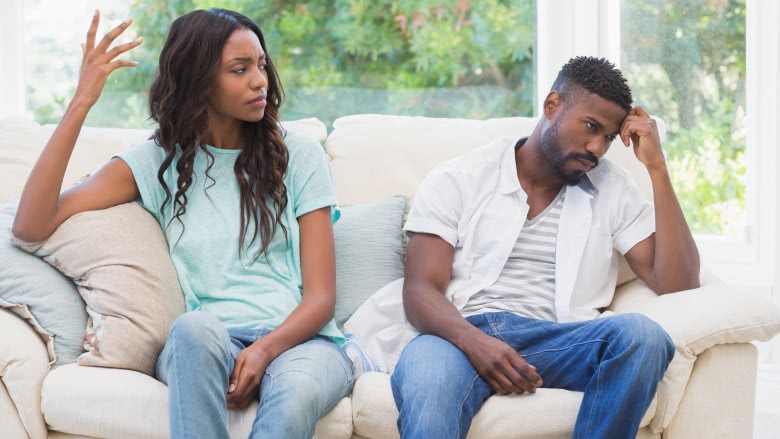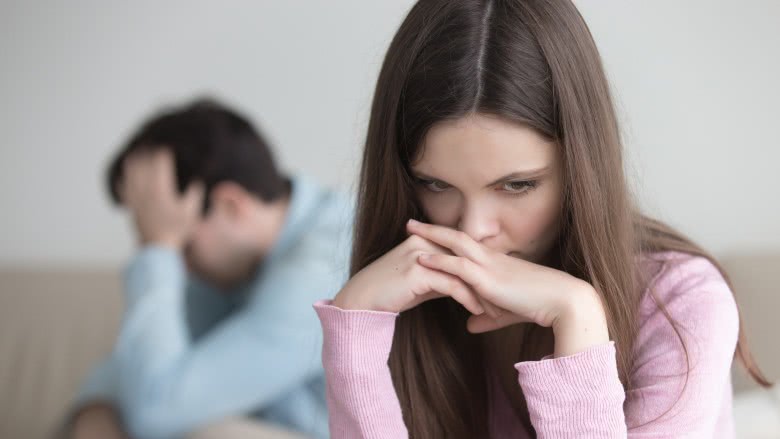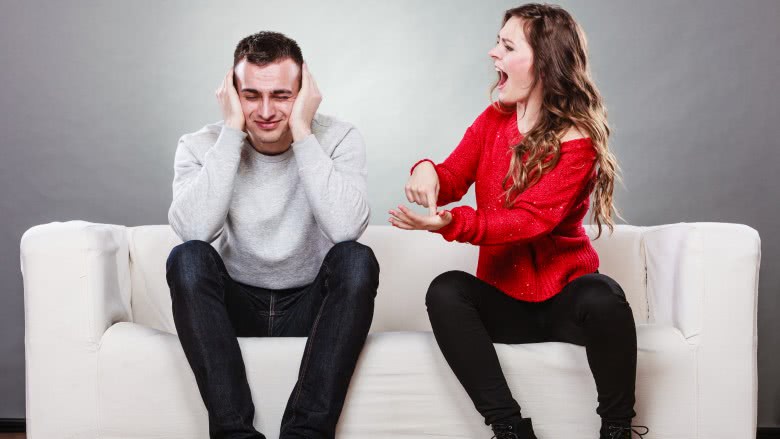Signs You Should See A Couples Therapist
Couples therapy can have negative connotations for a lot of people. If you don't believe me, just look at how tabloid magazines treat celeb couples who are rumored to be going to couples therapy. The idea is that if a couple is in therapy, they must be about to split.
While we've already dispelled that myth and explained why every relationship (romantic or otherwise) could benefit from couples therapy, not everyone understands the signs that it might help. I spoke to several therapists and relationship experts to find out the most common signs you should see a couples therapist.
There was a major betrayal
This one is probably the most obvious. If there has been major betrayal, like infidelity, it's probably a sign that something bigger is going on in the relationship that needs to be discussed. Psychotherapist Natalie Moore told me, "If you and your partner experienced a huge betrayal within the relationship, such as an affair (whether physical or emotional), financial infidelity, or another type of deception that has recently become known, I imagine this has shaken things up quite a bit." She added that couples may not even know how to proceed with this newfound information.
"Couples counseling can help you both process through the feelings of the betrayal and assist you both in deciding how to move forward," she said. "A professional can facilitate a conversation between you two that doesn't devolve into a screaming match or the silent treatment."
Psychiatrist Gail Saltz, who also wrote The Power of Different, agreed that infidelity can be a big reason couples seek therapy, but said that it's often used as a means to end the relationship. But there is hope, she told me, "About one third of couples who come for infidelity do resolve the issue and stay together, though."
There's more negativity than positivity
Several of the experts I spoke to mentioned that a successful relationship should be more positive than negative. Moore told me that the more negativity you see, the less likely the relationship will survive long-term. "Pay attention to the interactions you have with your partner over the next week or so," she said. "What's your ratio looking like?" She told me that if you're noticing a fair amount of negative interactions without many positive interactions to balance it out, couples counseling may be an option for you to consider.
Carrie Krawiec, a licensed marriage and family therapist, agreed. "Positives are light like feathers (which is how they make us feel) and negatives are heavy like cement. The more negatives there are the more 'debt' your relationship is accruing and you need to learn how to make some positive deposits," she said. Her examples of negative interactions include criticism and character attacks, defensiveness, contempt, and stonewalling (shutting down, storming off, etc.). "Other signs of negativity may be raised voice, use of the words 'always' or 'never,' blaming, sarcasm, harsh body language and facial expressions, vague statements, [and] passive aggressive behaviors (as well as [solely] passive or aggressive behaviors)."
Both Moore and Krawiec cited research that the ratio of positive to negative interactions should be five positives for every one negative. If you're finding the ratio a bit different from that ideal, couples counseling might be a good idea.
You have trouble communicating
It's no secret that communication is key in a healthy relationship, so it shouldn't come as a surprise that difficulty communicating is a reason to seek couples counseling. Moore told me that couples counseling "can help create a safe environment where both partners feel comfortable and empowered to communicate honestly and authentically with one another." She said that problems in communication often happen in one of two forms.
"[The first is] in couples where one or both partners has an avoidant style — meaning they prefer to disengage from connection completely when emotionally flooded, preferring to 'zone out' with electronics, become immersed in work responsibilities, etc." Moore said the second most common scenario is "in couples where one or both partners has an aggressive style — meaning they tend to use a loud volume, harsh tone, and make accusations that make it almost impossible to have a rational conversation with this person."
In both of these scenarios, couples counseling can help both people in the relationship learn how to communicate with one another about emotionally-charged topics.
The same issues keep coming up
Another issue related to conflict resolution, and a sign that couples counseling may be a good idea, is if the same problems keep coming up without resolution. Mark Sharp, a licensed clinical psychologist and author of Not Lonely at the Top: A Relationship Guide for the Courageous, Successful Single Who Hasn't Found the Love They Want told me that probably the most common sign couples should see a therapist is "if they start to see a repetitive conflict between them that they can't find a way to change."
He described these as arguments that always lead to the same place. "A pattern of escalating arguments that ultimately get dropped and lead to a period of not talking to each other, etc.," he said. "If something is repetitive, painful or harmful, and they can't change it on their own, they should seek help."
You don't argue
That's right, I said don't. A certain amount of conflict and arguing is normal and healthy in a relationship. Psychologist Sarah Allen told me that when couples aren't arguing at all, problems aren't being addressed. "Marriage works best when you are emotionally invested to problem-solve the issue to make it go away," she said. "When couples don't argue, it isn't true that they are so in love that they never have conflict, people can't always agree on everything, rather they have withdrawn from the relationship." She said that by not arguing you are forcing down your feelings, which can breed resentment.
Keith Miller, a licensed social worker who specializes in couples therapy, agreed. He told me, "Lack of conflict doesn't mean that you feel connected to your partner. Sometimes both partners are conflict-avoiders, and by the time they realize there is a problem, the husband has been sleeping with a different woman every few months and the wife is depressed but has no idea why."
You want different things for the future
People change over time. That's true both while single and in a relationship. Moore told me that when couples have very different goals, it could be time to see a therapist.
"If you and your partner have vastly different ideas about what the future should hold, this can make it difficult to envision a future together," she said. "Couples counseling can help you both clarify what you'd like for the future and if those dreams can be reconciled within the relationship."
Kimberly Hershenson, a clinical social worker based in New York City, said that differences in future goals can also be related to different values. "Every relationship involves compromise, but if values are too different, it may be time to see a marriage counselor," she said. "For instance, if family is important to you but not to your partner this will become a serious problem."
There's a lack of intimacy
While it's normal for the amount of sexual intimacy to have ebbs and flows as a relationship progresses, Hershenson told me that a lack of intimacy may be a red flag that indicates couples therapy is a good idea.
"Physical and emotional connection to your partner is crucial but it is often difficult when there are baths needing to happen, meals needing to be eaten, and toys needing to be picked [up]," she said. "Maintaining intimacy is very important and if this is lacking in your relationship it is time to see a professional for advice."
If not, and if the lack of intimacy continues, you may find yourself thinking about someone else, another big warning sign you should see a therapist, according to Hershenson. "It's human nature to fantasize about what life would be like with someone else," she said. "It becomes a problem when you are constantly choosing to daydream about a life with someone else." Whether or not this type of fantasizing leads to infidelity, the fact that you are thinking extensively about what life might be like with another means it's time to get help in your current relationship.
There's been a major life change
Infidelity isn't the only major life event that can propel couples into therapy. Lesli Doares, a couples consultant and coach, told me, "The best indicator that a couple should seek help is any time there is a major change in the relationship."
Doares said that getting married in the first place counts as one of these major events and that many of the problems that arise later and risk tearing couples apart could actually be resolved through pre-marital work. "Unfortunately, the problems that could be addressed in pre-marital work continue until there is a breaking point. Often, the damage is pretty severe by this time especially if there has been an affair," she said.
It sounds like sooner rather than later is the name of the game for couples counseling, in order to have the best chance at helping to resolve your issues.
You don't have fun together
Shane Birkel, a licensed marriage and family therapist from New Hampshire, told me that one sign couples should see a therapist, is if there is no real friendship or you don't have fun spending time together anymore.
"When couples have kids, jobs, and life responsibilities it can be easy to forget to make the friendship a priority," Birkel told me. "This happens when all of our conversations are about getting through the week and we forget to take a moment to smile, laugh, and have fun with each other."
Birkel also told me that it's important for couples to think about when they last had a date night. Try scheduling one, or doing something fun together. And if that doesn't work to bring back that sense of friendship and fun, it may be time to see a couples therapist.
You've thought about it
The thing about couples counseling, is that the result may not always be complete resolution of a problem and a happily ever after ending. Still, couples counseling can help both parties develop a deeper understanding of themselves and each other, which is helpful regardless of the final outcome.
Judi Cineas, a licensed clinical social worker and founder of Living The Dream, told me that the biggest clue that a couple should consider counseling is that one or both have thought about it. "My recommendation is always that if you think you need it, there was a reason that led to the thought and you should follow through," she said.
So if you've been thinking your relationship might benefit if you saw a couples therapist, trust your gut and make an appointment. You have everything to gain.











